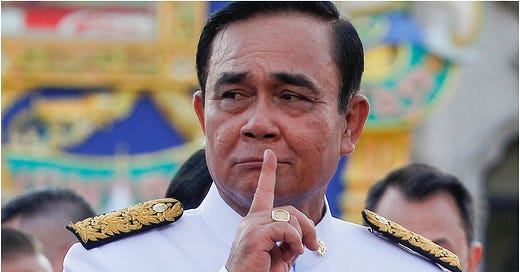Update: Thai PM Given New Term by High Court
Against the odds, Constitutional Court Agrees Prayuth gets a new term
Update: Thailand’s Constitutional Court ruled on September 30, that Prayuth Chan-ocha, the 68-year-old former general who ended representative democracy in 2014 with a military coup, can bend his own rules enough to stay on for another term as the country’s prime minister.
The current constitution, written by the generals, stipulates that the prime minister “shall not hold office for more than eight years in total, whether or not consecutively. However, this shall not include the period during which the prime minister carries out duties after vacating the office.”
The law was written by the junta itself to prevent onetime Prime Minister Thaksin Shinawatra, who served from 2001 to 2006 before being ousted in a coup but who remains extremely popular with the rural masses even 17 years later, from returning to office.
Although the law appears clear, the court ruled that Prayuth’s most recent term didn’t mean he has been in office for eight years. He will serve until a new election is called by next March, with an election date in May.
Now opposition figures were attempting to use the constitutional provision against Prayuth, who took office on August 24, 2014, three months after the coup he led that deposed Yingluck Shinawatra, Thaksin’s sister, who was serving as premier and head of the Pheu Thai Party, a Thaksin surrogate.
The court, which rarely rules on the merits of a case but instead takes its direction from the palace of King Maha Vajiralongkorn, or the army, suspended Prayuth on August 24, acting on an opposition petition. The king is said to have grown tired of Prayuth and the palace retinue has been critical of him. The fact that the court acted on the petition to suspend Prayuth is more an indication that forces out to end his rule are dissatisfied with the country’s lackluster economic performance, with GDP expected at an anemic 2.9 percent in 2022, and with a general feeling that the government’s rule is uninspiring and tired and its handling of the Covid-19 pandemic, which crashed the indispensable tourism industry, has been disastrous.
The army’s reign has been visibly corrupt and incompetent, with generals hardly bothering to conceal their attempts to amass wealth, turning off the Bangkok elites who wanted Thaksin and his sister ousted because they were empowering the rural poor and the Bangkok powerless. Nonetheless, the former general is a wily strategist who has beaten back other attempts to get rid of him. He remains minister of defense, which gives him considerable clout within the service, until the next premier is chosen and he retains the loyalty of at least some of the military.
Jockeying has been intense among Prayuth’s followers, who argue that his term should run from either April 6, 2017, when the current constitution came into force, or June 9, 2019, when he assumed the premiership following the general election in March that year. That, his forces believe, would allow him to serve another five years, until 2027, provided the army-backed parties win a fresh mandate in the general election tentatively scheduled for May 7.
The parliamentary opposition, led by Chonlanan Srikaew and the Pheu Thai Party, which still owes its allegiance to the exiled Thaksin, now living in Dubai, and Prayuth adversaries in his own army-backed Palang Pracharat argue that the constitutional clause is designed to prevent a “monopoly of power.” It is possible that, with Palang Pracharat losing influence, Thailand could experience a rational election.
If Prayuth loses, he is immediately ousted from the premiership, with both houses of the parliament picking from a list of five candidates – Anutin Charnvirakul and Abhisit Vejjajiva from the coalition’s Bhumjaithai and Democrat parties, respectively, and Chaikasem Nitisiri, Chadchart Sittipunt and Sudarat Keyuraphan from Pheu Thai.
Anutin, the deputy prime minister and public health minister and the architect of Thailand’s legalization of cannabis earlier this year, is far and away the leading candidate in this current situation. He is the putative Bhumjaithai leader although the party’s godfather is Newin Chidchob, a thuggish northeastern Thai political figure whom many suspect of being involved in the drug trade.
Prawit Wongsuwan, the former army chief, has been energetically running the office since Prayuth was suspended. Anupong Poachinda, the interior minister, is also angling to find a way to take over.
Then there is Pheu Thai, which despite being trampled by a series of court decisions and other setbacks, Pheu Thai seems alive and well, particularly – although he isn’t a member – because of the energetic performance of the popular Chadchart Sittipunt, the pro-democracy candidate who won the Bangkok governorship in a landslide in June and who formerly belonged to Pheu Thai. He is believed to still be connected to the party despite professing otherwise.
Nonetheless, Chadchart has become the fresh face of the opposition by actually working to govern the chaotic city. In addition, the youth-oriented Future Forward Party, which was ordered dissolved last year after it became perceived as a popular threat, has been reconstituted as the Move Forward Party. In the most recent general election, Pheu Thai, Future Forward, and smaller opposition parties actually won a majority in the 500-member lower house but were thwarted when Prayuth managed to lure a handful of “cobra” parties to change sides.
The military and the ruling Palang Pracharath Party, which the military dominates, almost look like they would be happy to allow somebody else to run the place for awhile – as long as the military can preserve its place in the power structure, which it has maintained since June of 1933, when it successfully overthrew the constitutional government and ended the absolute monarchy.




